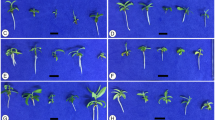Abstract
-
1.
This is a report on a preliminary investigation of the causes of insufficient fruit setting in the strawberry variety Jucunda, especially its clone JK3
-
2.
From field experiments in different localities it was concluded:
-
a
that raw weather increases the percentage of malformed fruits (nubbins) in Jucunda, especially in clone JK3, and
-
b
that interplanting with a good pollen variety (Deutsch Evern) may decrease this percentage.
-
3.
An insufficient pollination may take place in the centre of too closely planted beds.
-
4.
Bees do not improve fruit setting in Jucunda.
-
5.
Usually the development of good anthers in Jucunda is not abundant, which means that the quantity of pollen produced is not large.
-
6.
The quality of the pollen, expressed as a percentage of morphologically good pollen, of the bad clone JK3 was sometimes a little lower than that of the good clones of Jucunda.
-
7.
Meiosis in the anthers of clone JK3 was normal.
-
8.
The fruit setting of the variety Deutsch Evern was good at all temperatures of the range of 10\2-26\dgC, whereas that of Jucunda was only good at 17\2-26\dgC. At 14\dgC and lower the fruit setting in Jucunda was reduced to zero.
-
9.
As the phenomena of this type of unfruitfulness are greatly influenced by the growth conditions of the plants, further investigation of this problem will be carried out under controlled conditions.
Samenvatting
-
1.
Dit is een verslag van een oriënterend onderzoek naar de oorzaak van onvoldoende vruchtzetting in het aardbeiras Jucunda, speciaal van de kloon JK3.
-
2.
Uit veldproeven werd geconcludeerd:
-
a
dat guur weer het percentage ‘kattenogen’ in Jucunda verhoogt, speciaal in kloon JK3, en
-
b
dat tussenplanting met een ras met een goed stuifmeel (Deutsch Evern) het percentage kattenogen kan verlagen.
-
3.
Onvoldoende bestuiving kan ontstaan in het midden van te dichte bedden.
-
4.
Bijen verbeteren de vruchtzetting van Jucunda niet.
-
5.
Gewoonlijk is de ontwikkeling van goede meeldraden in Jucunda niet overvloedig, hetgeen betekent dat de hoeveelheid stuifmeel gering is.
-
6.
De kwaliteit van het stuifmeel (als % morphologisch goede pollenkorrels) van JK3 is soms iets lager dan dat van de goede Jucunda klonen.
-
7.
De reductiedeling in de helmhokjes van JK3 was normaal.
-
8.
De vruchtzetting van Deutsch Evern was goed bij alle temperaturen in de reeks van 10–26°C, terwijl die van Jucunda slechts goed was bij 17–26°C. Bij 14°C of lager vond in Jucunda in het geheel geen vruchtzetting plaats.
-
9.
Daar dit type van onvruchtbaarheid sterk door de groeiomstandigheden van de planten wordt beïnvloed, zal het verdere onderzoek onder gereguleerde omstandigheden plaats vinden.
Similar content being viewed by others
References
Braak, J. P. en Zeilinga, A. E., “Chromosomen studie”. Jaarverslag I.V.T. 1951–1952: 25–26.
Gils, C. A. M. A. Van, De vruchtzetting van Jucunda. Boer en Tuider 4 (1950): 188, 26 aug.
Kronenberg H. G., Proeven over de vruchtzetting van Jucunda. Boer en Tuinder 7 (1953), 10 jan.
Kronenberg, H. G., Poor fruit setting in strawberries. I. Causes of a poor fruit set in strawberries in general. Euphytica 8 (1959): 47–57.
Author information
Authors and Affiliations
Rights and permissions
About this article
Cite this article
Kronenberg, H.G., Braak, J.P. & Zeilinga, A.E. Poor fruit setting in strawberries. II. Euphytica 8, 245–251 (1959). https://doi.org/10.1007/BF00039367
Received:
Issue Date:
DOI: https://doi.org/10.1007/BF00039367




